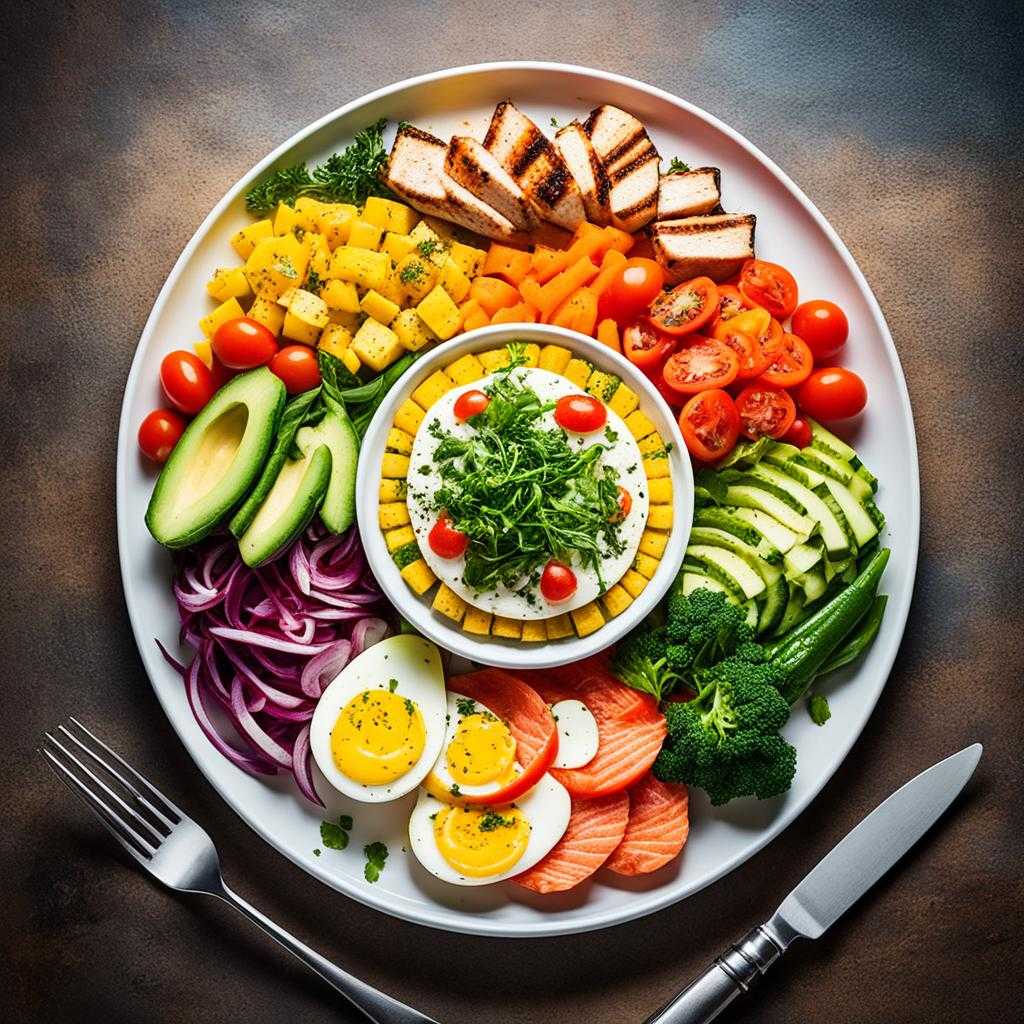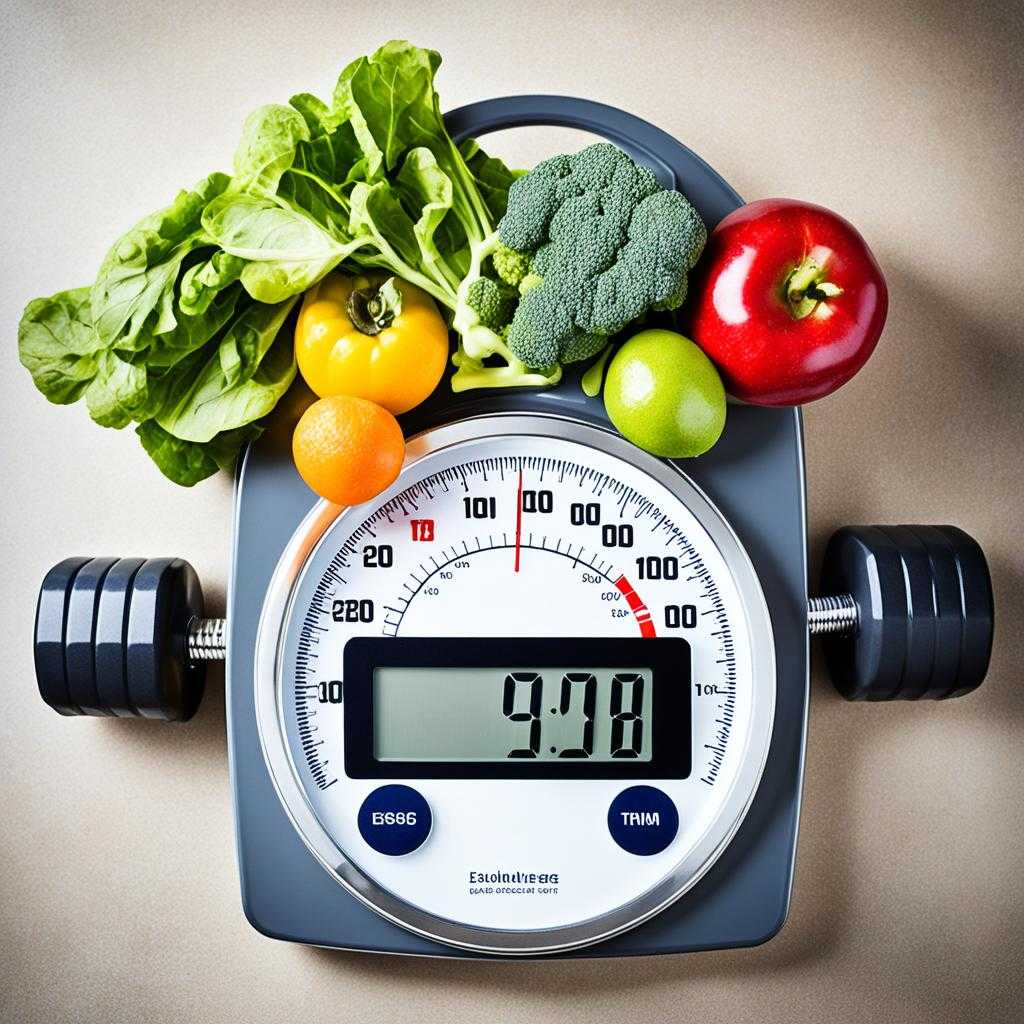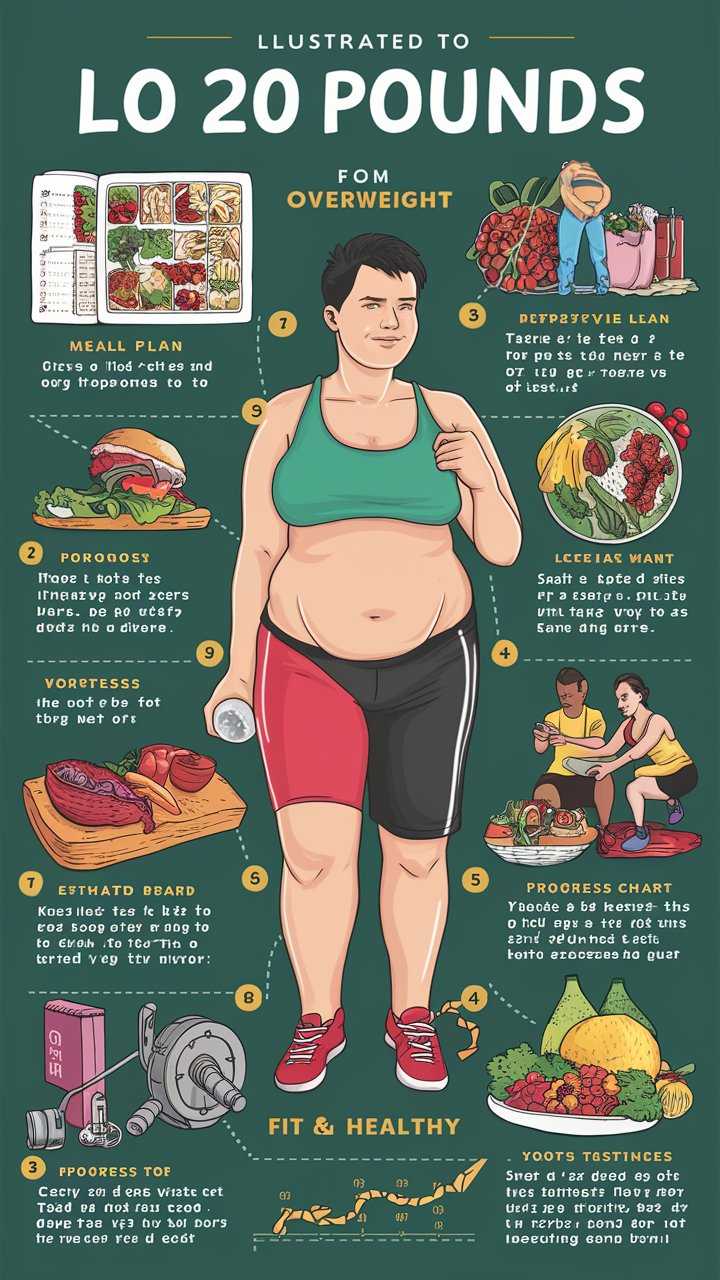Lose 5 Pounds in a Week: Effective Tips & Tricks
Discover proven strategies to lose 5 pounds in a week safely and effectively. Our expert tips cover diet, exercise, and lifestyle changes for rapid weight loss.
Trying to lose weight quickly can be tempting, but it’s key to do it in a healthy way. Losing up to 5 pounds in a week is possible, but doctors don’t recommend it. The National Institutes of Health and the Centers for Disease Control and Prevention suggest losing 1-2 pounds a week for better health and lasting success.

Fast weight loss can cause muscle loss, slow down your metabolism, and lead to dehydration and nutrient shortages. It can also cause other health problems. Instead, make slow, steady changes to your eating and exercise habits. This way, you can lose weight safely and effectively.
Key Takeaways
- Rapid weight loss of 5 pounds per week is not recommended for long-term health and well-being.
- Aim for a more gradual weight loss of 1-2 pounds per week for safe and sustainable results.
- Avoid extreme calorie restriction, as it can lead to muscle loss, slower metabolism, and other health concerns.
- Focus on making gradual, healthy changes to your diet and exercise routine for effective and sustainable weight loss.
- Consult with a healthcare professional to develop a personalized weight loss plan that works for your unique needs and goals.
The Truth About Rapid Weight Loss
Losing 5 pounds in a week might seem appealing, but it’s not safe or sustainable. To lose this much weight, you’d need to cut calories by 17,500 in just 7 days. Such a drastic calorie cut can harm your health, causing muscle loss, a slower metabolism, dehydration, and nutrient shortages.
Losing 5 Pounds a Week: Is It Safe?
Health experts say losing 1-2 pounds a week is safe. This slower pace lets you make lasting changes to your diet and lifestyle. Losing weight too fast can be more harmful than helpful, affecting your overall health and wellbeing.
The Downside of Rapid Weight Loss
- Muscle loss: An extreme calorie deficit can lead to the breakdown of muscle tissue, which can slow your metabolism and make it harder to maintain weight loss in the long term.
- Slower metabolism: Rapid weight loss can cause your metabolism to slow down, making it harder to keep the weight off once you return to a more sustainable eating plan.
- Dehydration: Severe calorie restriction can lead to dehydration, which can cause a host of other health problems.
- Nutrient deficiencies: Cutting calories too drastically can result in a lack of essential vitamins, minerals, and other nutrients, which can have negative impacts on your overall health.
Instead of chasing rapid weight loss, focus on sustainable, healthy habits. This might mean making slow changes to your diet, increasing exercise, and adopting a holistic wellness approach.
“Rapid weight loss is not recommended by health experts, as it is unsustainable and can be more harmful than beneficial in the long run.”
Healthy and Sustainable Weight Loss Strategies

When looking at weight loss, focus on making lasting changes, not quick fixes. Quick weight loss often leads to yo-yo dieting, which is bad for your health. Instead, aim for sustainable weight loss by eating well and exercising regularly.
For gradual weight loss, try eating fewer calories through a balanced diet and staying active. Aim to lose 1-2 pounds a week to lose fat, not muscle. This slow pace helps you build healthy habits that last, leading to better results.
- Focus on a balanced, nutrient-rich diet that includes a variety of whole, unprocessed foods.
- Incorporate regular physical activity, such as a combination of cardio and strength training, into your routine.
- Address underlying factors that may be contributing to weight gain, such as stress, sleep, and mental health.
- Celebrate small victories and be patient with the process, as sustainable weight loss takes time and persistence.
By sticking to a healthy diet and exercise routine, you can achieve sustainable weight loss and better health. Remember, focus on making slow, lifestyle changes that fit into your daily life.
“The only way to achieve sustainable weight loss is to make gradual, lifestyle-based changes that you can stick to over time.”
| Approach | Weight Loss Rate | Sustainability | Health Impact |
|---|---|---|---|
| Rapid Weight Loss | 2-4 pounds per week | Low, often leads to weight regain | Can be harmful, may cause muscle loss, nutrient deficiencies, and other health issues |
| Sustainable Weight Loss | 1-2 pounds per week | High, promotes long-term lifestyle changes | Healthy, helps preserve muscle mass and improve overall well-being |
High Protein, Low-Calorie Foods for Weight Loss

For weight loss, focus on foods that are both high in protein and low in calories. These foods help control hunger, boost metabolism, and give your body the nutrients it needs. Let’s look at some top lean protein and fiber-rich foods for your weight loss plan.
Lean Protein Sources
Adding lean protein to your meals can really help with weight loss. These foods keep you full and help you keep your muscle mass while losing fat. Here are some top lean protein sources:
- Eggs
- Wild-caught salmon
- Boneless, skinless chicken breast
- Greek yogurt
- Beans and lentils
Fiber-Rich Foods
Fiber-rich foods are also key for weight loss. Fiber slows down digestion, making you feel fuller longer and supporting a healthy gut. Adding more of these foods to your diet can help you reach your weight loss goals:
- Artichokes
- Almonds
- Pumpkin seeds
- Chia seeds
- Leafy greens
By choosing high-protein, low-calorie foods and fiber-rich options, you can make a diet that’s both nutritious and filling. A balanced diet is essential for reaching your health and fitness goals.
“Incorporating more lean protein and fiber-rich foods into your diet can be a game-changer for weight loss.”
Lose 5 Pounds in a Week: Is It Realistic?

Losing 5 pounds in a week sounds good, but health experts say it’s not safe or realistic. You can lose weight fast by eating very few calories and exercising a lot. But, this method is not good for keeping the weight off long-term.
A better way is to lose 1-2 pounds each week. This helps you lose fat, not just water or muscle. Losing weight too fast can cause many problems, like not getting enough nutrients, getting gallstones, losing hair, and a slower metabolism.
Instead of just focusing on losing weight, focus on making healthy habits. This means eating well, exercising regularly, and changing your lifestyle in ways you can keep up with. These changes help you lose weight and stay healthy.
“Rapid weight loss can be tempting, but it’s important to remember that sustainable weight loss is a marathon, not a sprint. Slow and steady progress is the key to lasting success.”
It’s okay to want to lose 5 pounds quickly, but setting realistic weight loss goals is key. Aim for a slower pace to lose 5 pounds weight loss in a week and more. This way, you’ll also build healthy habits that will help you for a long time.

Calorie Deficit for Weight Loss
To lose weight in a healthy way, you need to create a calorie deficit. This means eating fewer calories than you burn. Aim to cut your daily calories by 500-1,000 through diet, exercise, or both. This helps your body use fat for energy, leading to slow and steady weight loss.
Calculating Your Calorie Needs
Finding out how many calories you need is key to a healthy calorie deficit. Your age, gender, activity level, and weight affect your calorie needs. A healthcare professional or dietitian can help you figure this out and make a plan for losing weight.
On average, women need 1,600 to 2,400 calories a day, and men need 2,000 to 3,000 calories. But these numbers can change based on your body and lifestyle. Knowing your calorie needs helps you find a safe calorie deficit for losing 1-2 pounds a week.
“Losing 1-2 pounds per week is a safer and more effective approach than extreme calorie restriction.”
Talking to a healthcare professional or dietitian is a good idea. They can help you find the right calorie intake and exercise plan for you. This way, your calorie deficit is just right, avoiding harmful effects and ensuring you can keep losing weight.
The Importance of Not Skipping Meals
Losing weight can be tough, and skipping meals might seem like a quick fix. But, it can actually slow down your weight loss. Skipping meals can harm your metabolism and hurt your efforts to lose weight.
Skipping meals tells your body it’s in danger. It slows down your metabolism to save energy. This makes it harder to burn calories and lose weight. Plus, you might not get enough nutrients, which is bad for your health.
It’s better to eat regularly and eat well. Try to have meals every 4-6 hours. This keeps your energy up and your metabolism working right. It helps you lose weight and stay healthy.
Eating foods full of protein, fiber, and complex carbohydrates is good for you. These foods make you feel full and less likely to snack on junk food.
“Skipping meals can slow down your metabolism and lead to nutrient deficiencies, which can ultimately sabotage your weight loss efforts.”
For lasting weight loss, eating well is key. Don’t skip meals to avoid harming your metabolism and missing out on important nutrients.
Cut Starchy Carbs for Rapid Weight Loss
Reducing starchy, processed carbs can lead to quick weight loss. Foods like bread, pasta, and baked goods can cause water retention and bloating. Some people may not digest these carbs well, which can lead to weight gain.
By eating fewer starchy carbs and more fiber-rich veggies and whole grains, you might lose water weight. But remember, this should be part of a bigger plan that includes a balanced diet and exercise.
The Downside of Starchy Carbs
Carbs in white bread, white rice, and potatoes can hinder weight loss. These starchy carbs are quickly digested, causing spikes in blood sugar and insulin. This can lead to water weight gain and make losing weight hard.
For those with carbohydrate intolerance, eating too many starchy carbs can cause digestive problems and make it hard to keep a healthy weight. Cutting down on these carbs can lead to faster weight loss in the short term.
| Starchy Carbs to Limit | Healthier Alternatives |
|---|---|
| White bread, pasta, and rice | Whole grain breads, quinoa, and brown rice |
| Potatoes and french fries | Sweet potatoes and roasted vegetables |
| Pastries and baked goods | Whole grain muffins and homemade baked goods |
“Cutting back on starchy carbs can help you lose water weight and reduce bloating, but it’s essential to maintain a balanced, sustainable approach to weight loss.”
Pile on the Protein for Weight Loss
Eating a diet high in protein can help you lose weight in a healthy way. Protein makes you feel full longer than carbs or fats. This is great when you’re eating fewer calories, as it reduces hunger and cravings.
Also, a diet rich in protein helps keep your muscle mass while losing weight. Muscle burns more calories than fat, even when you’re not active. Keeping your muscle means you lose more fat, which is key for a healthy weight loss.
Some top high-protein, low-calorie foods are:
- Eggs
- Chicken
- Fish
- Greek yogurt
- Beans
- Nuts
Adding these lean protein foods to your meals and snacks helps with weight loss. It controls hunger and keeps your muscle. Choosing a high-protein diet sets you up for success in reaching your weight goals.
| Protein Source | Calories (per serving) | Protein (per serving) |
|---|---|---|
| Chicken breast (4 oz) | 165 | 31g |
| Salmon (4 oz) | 196 | 22g |
| Greek yogurt (6 oz) | 100 | 17g |
| Eggs (2 large) | 140 | 12g |
| Lentils (1 cup cooked) | 230 | 18g |
| Almonds (1/4 cup) | 205 | 6g |
By adding these high-protein, low-calorie foods to your diet, you support your weight loss efforts. You’ll stay healthy and balanced.
Conclusion
Losing weight in a healthy way is a journey that needs a balanced approach. Trying to lose 5 pounds in a week is not safe or realistic. It can lead to bad habits and frustration.
Instead, focus on healthy weight loss strategies for slow, lasting results. This means creating a calorie deficit, eating foods high in lean protein and fiber, drinking plenty of water, and being active. Slowly changing your lifestyle can help you reach your weight loss goals and improve your health.
The secret to losing weight is not quick fixes. It’s about sticking to sustainable habits. Talk to a healthcare professional or a dietitian to get a plan that fits your needs and goals. This way, you can start a journey of healthy, lasting weight loss.









